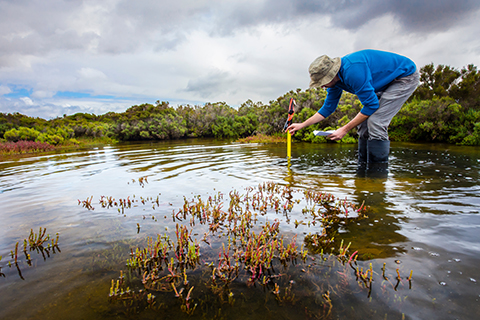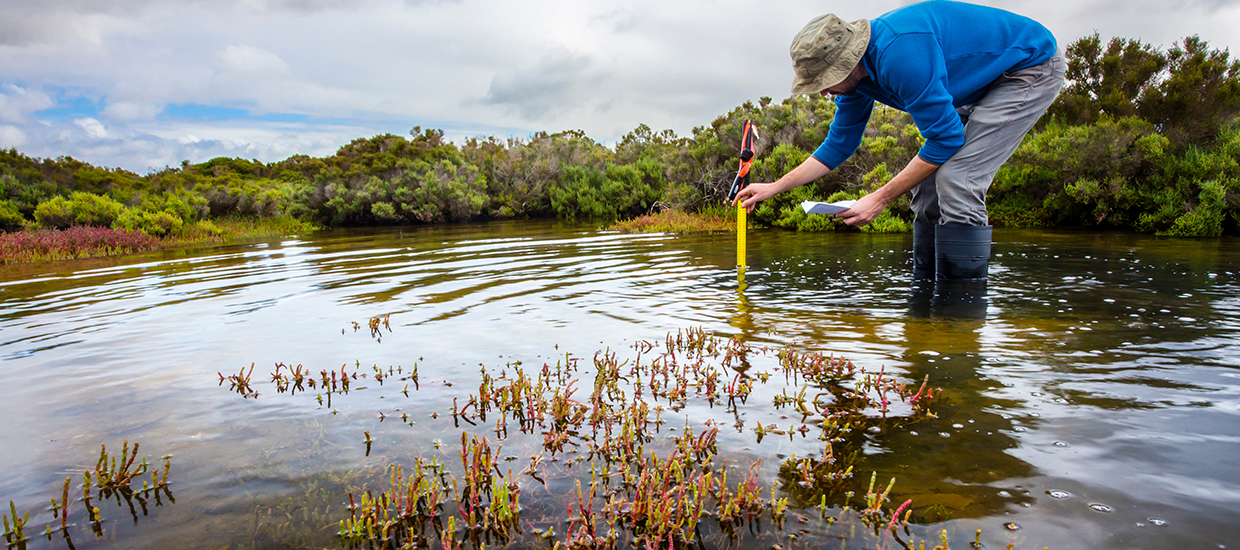Science Core Courses
|
|
|
A science course at the 110 level or above with lab (BIL, GSC, MSC, PHY)
|
4
|
|
CHM 111
& CHM 113
|
Principles of Chemistry I
and Chemistry Laboratory I
|
4
|
|
CHM 112
& CHM 114
|
Principles of Chemistry II
and Chemistry Laboratory II
|
4
|
|
CAE 240
|
Environmental Pollution
|
3
|
|
or CAE 340
|
Introduction to Environmental Engineering
|
Complete one of the following ECS science tracks:
|
9-22
|
|
Climate Science and Policy Track
|
|
| MSC 111 Introduction to Marine Science |
3
|
|
ATM 102 Introduction to Weather and Climate OR
ATM 103 Survey of Meteorology [MTH 108 co-requisite]
|
3
|
|
MSC 346 Climate and Science Policy*
|
3
|
|
Select 2 courses from the following:
|
3
|
|
ATM/MSC 220 Climate and Global Change
|
3
|
|
MSC 222 Earth’s Climate: Past and Future
|
3
|
|
GSC 462 (Earth’s Ancient Atmospheres, Climates, and Sea Levels) [GSC 110 + 111 pre-requisites]
|
3
|
|
Other approved climate science course
|
|
| One course from the following: |
|
|
MSC 313 Coastal Law
|
3
|
|
MSC 314 Ocean Law
|
3
|
|
MSC 340 Ocean Policy
|
3
|
| MSC 342/ECS 374 Decision-making & the Environment) |
3
|
|
Other approved climate policy course
|
|
|
18 credits total. Completion of track also satisfies a minor in Climate Science & Policy.
|
|
|
*MSC 346 (co-‐listed with ECS 403) taken to satisfy the Climate Science track cannot also satisfy the ECS 403 core course requirement; a separate ECS 403 section must be taken.
|
|
| |
|
|
Conservation Biology Track
|
|
|
BIL 150/151 General Biology +lab
|
4 + 1
|
|
BIL 160/161 Evolution and Biodiversity + lab
|
4 + 1
|
|
Select 12 credits from the following (must include 3 credits in the field/lab category)
|
|
|
BIL 226 General Botany
|
3
|
|
BIL 220 Evolution and Disease
|
3
|
|
BIL 230 Marine Biology
|
3
|
|
BIL 250 Genetics
|
3
|
|
BIL 315 Marine Biota and Biogeochemical Cycles
|
3
|
BIL 316 Global Primary Production
|
3
|
BIL 330 Ecology
|
3
|
|
BIL 350 Survey of Marine Mammals
|
3
|
|
BIL 360 Comparative Physiology
|
3
|
|
BIL 385 Special topics in biology: Conservation and Protected Areas
|
3
|
|
BIL 415 – Coral Reef Science and Management
|
3
|
|
BIL 433 Conservation in Practice*
|
3
|
BIL 435 Origins, Ecology and Conservation in Insular Diversity
|
3
|
BIL 441 Animal Behavior
|
3 |
BIL 539 Conservation and Protected Areas **
|
3 |
|
Other approved conservation-‐related course
|
|
|
Field/Lab category:
|
|
|
BIL 221 Biology of Birds
|
4
|
|
BIL 227 General Botany Laboratory
|
1
|
|
BIL 231 Marine biology lab
|
1
|
|
BIL 321 Invertebrate Zoology
|
|
|
BIL 331 Ecology lab
|
1
|
| BIL 332 Ecology and Land Use in the Galapagos * |
3
|
| BIL 432 Ecology in the Galapagos * |
3
|
| BIL 466 Environmental Physiology: Oxygen, Water, and Ionoregulatory Stress |
1
|
| BIL 525 Herpetology in the Galapagos * |
3
|
|
Other approved field or lab biology course
|
|
|
22 credits total. Completion of track also satisfies a minor in biology.
|
|
|
* This course is taught at UGalapagos in Fall.
**BIL 539 (co-‐listed with ECS 403) taken to satisfy the Conservation Biology track cannot also satisfy the ECS 403 core course requirement; a separate ECS 403 section must be taken.
|
|
| |
|
|
Environmental Chemistry Track: 1
|
|
|
Select 3 of the following (must include 2 labs):
|
|
|
CHM 201
& CHM 205
|
Organic Chemistry I (Lecture)
and Organic Chemistry Laboratory I
|
|
|
CHM 202
& CHM 206
|
Organic Chemistry II (Lecture)
and Organic Chemistry Laboratory II
|
|
|
CHM 360
& CHM 364
|
Physical Chemistry I (Lecture)
and Physical Chemistry (Laboratory I)
|
|
|
CHM 365
& CHM 464
|
Physical Chemistry II (Lecture)
and Physical Chemistry (Laboratory II)
|
|
|
CHM 401
|
Environmental Chemistry
|
|
| |
|
|
|
Environmental Health Track: 2
|
|
|
Select 3 of the following:
|
|
|
CHM 201
& CHM 205
|
Organic Chemistry I (Lecture)
and Organic Chemistry Laboratory I
|
|
|
MIC 301
|
Introduction to Microbiology and Immunology
|
|
|
MIC 322
|
Medical Parasitology
|
|
| |
|
|
|
Geology Track: 3
|
|
|
GSC 260
|
Earth Materials
|
|
|
Select 2 of the following:
|
|
|
GSC 360
|
Depositional and Diagenetic Systems
|
|
|
GSC 380
|
Paleontology and Stratigraphy
|
|
|
GSC 410
|
Environmental Geochemistry
|
|
|
GSC 420
|
Geophysics
|
|
|
GSC 480
|
Structural Geology
|
|
|
GSC 550
|
Hydrogeology
|
|
| |
|
|
|
Geospatial Certificate Track: 4
|
|
|
GEG 199
|
Introduction to GIS (Geographic Information Systems)
|
|
|
GEG 391
|
Intermediate GIS (Geographic Information Systems)
|
|
|
GEG 392
|
Remote Sensing of the Environment
|
|
|
Select 2 of the following:
|
|
|
GEG 491
|
GIS and Environmental Modeling
|
|
|
GEG 545
|
Special Topics (Web-GIS)
|
|
|
GEG 545
|
Special Topics (Advanced SAR Techniques and Applications)
|
|
|
GEG 545
|
Special Topics (GIS in Public Health)
|
|
| |
|
|
|
Mathematics Track: 6
|
|
|
MTH 359
|
Mathematical Models in Biology and Medicine
|
|
|
Select 2 of the following:
|
|
|
MTH 210
|
Introduction to Linear Algebra
|
|
|
MTH 310
|
Multivariable Calculus
|
|
|
MTH 311
|
Introduction to Ordinary Differential Equations
|
|
| |
|
Mathematics Courses
|
|
|
Select 1 of the following:
|
5-8
|
|
MTH 151
& MTH 162
|
Calculus I for Engineers
and Calculus II
|
|
|
MTH 161
& MTH 162
|
Calculus I
and Calculus II
|
|
|
MTH 171
& MTH 172
|
Calculus I
and Calculus II
|
|
|
Select 1 of the following Statistics courses:
|
3
|
|
ECS 204
|
Environmental Statistics
|
|
|
MSC 204
|
Environmental Statistics
|
|
|
BIL 311
|
Biostatistics
|
|
|
MTH 224
|
Introduction to Probability and Statistics
|
|
|
PSY 292
|
Introduction To Biobehavioral Statistics For Non-Majors
|
|
| |
|
Social Science Core Courses
|
|
|
Select 1 of the following Economics/Political Science courses for BS:
|
3
|
|
ECS 377
|
Topics in Environmental Economics and Development
|
|
|
ECO 211
|
Economic Principles and Problems
|
|
|
ECO 212
|
Economic Principles and Problems
|
|
|
INS 102
|
Global Economics
|
|
|
INS 421
|
Poverty and the Environment
|
|
|
MSC 345
|
Economics of Natural Resources and the Environment
|
|
|
POL 201
|
Introduction to American National Government
|
|
|
POL 202
|
Introduction To Comparative Politics
|
|
|
POL 203
|
Introduction to International Relations
|
|
|
Select 1 of the following ECS social science skills courses for BS: 7
|
3
|
|
BSL 212
|
Introduction to Business Law
|
|
|
BSL/MSC 314
|
Ocean Law
|
|
|
STC 114
|
Principles of Advertising
|
|
|
JMM 106
|
Visual Design
|
|
|
JMM 341
|
Web Design
|
|
|
ECS 376
|
Topics in Environmental Communication
|
|
|
ECS 377
|
Topics in Environmental Economics and Development
|
|
|
EPS 321
|
Understanding Human Service Organizations
|
|
|
FIN 300
|
Fundamentals of Finance for Non-Finance Majors
|
|
|
FIN 302
|
Fundamentals of Finance
|
|
|
GEG 120
|
Physical Geography
|
|
|
GEG 199
|
Introduction to GIS (Geographic Information Systems)
|
|
|
INS 503
|
Int Relations Topics (e.g., Role of Foreign Aid in International Development)
|
|
|
LAS 502
|
Research Design in Latin American Studies
|
|
|
MGT 303
|
Operations Management
|
|
|
MGT 353
|
Introduction to Entrepreneurship
|
|
|
MKT 201
|
Foundations of Marketing
|
|
|
PHI 110
|
Critical Thinking
|
|
|
PHI 215
|
Logic and Law
|
|
|
POL 314
|
Legislative Processes
|
|
|
POL 342
|
State and Local Government and Politics
|
|
|
POL 353
|
Interest Groups and Lobbying
|
|
|
POL 524
|
Non-Profit Organizations: Law, Policy, and Management
|
|
|
SOC 210
|
Introduction to Social Research
|
|
|
Total Credit Hours
|
68-82
|





